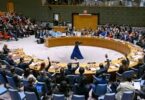PM Shahid Khaqan Abbasi chaired the National Security Committee (NSC) meeting which expressed its unwavering resolve to keep country’s defense impregnable against all forms of external aggression.
It also condemned the human rights violation in the Indian occupied Kashmir and showed deep concern over the repeated incidents of firing along the line of control (LOC) by Indian, resulting in the loss of innocent lives. The NCS deliberated at length over the current developments in the relationship with Afghanistan and reiterated Pakistan’s commitment for peace through an Afghan led and owned peace process.
Human rights violation in the Indian occupied Kashmir is an ongoing issue which ranges from mass killing and blinding of resisting Kashmiri youth by pellets firing. These atrocities also include forced disappearance, sexual abuse and torture of prisoners beside political repression and suppression of freedom of speech. The human rights groups have accused the Indian govt. of an “Institutional cover-up” to avoid punishing dozens of high ranking military and police officials implicated in the killings, torture and sexual violence in Kashmir.
A report by the International People Tribunal on Human rights and Justice has identified more than 900 individuals whom it blames for a range of human right abuses. They include 150 officers of Indian army of the ranked of major and above. This report of heinous crime against the people is also confirmed by the association of parents of disappeared persons. Although, our political leadership, diplomats at the UN and foreign office officials raise the issue of atrocities perpetrated on the innocent Kashmiris in their speeches and statements, yet a consistent foreign policy strategy has not been put in place to engage the world powers and Muslim countries in mounting a constant diplomatic pressure on India to stop human rights violation.
The incidents of firing and shelling by Indian troops on the LOC have become almost a daily affair in which our military officials and civilians lose their lives. The Nirandra Modhi government of India is adamant on the restoration of composite dialogues and a stalemate continues in Pak-India relation. Hence, the discussion on core issue of Kashmir and disputes of Ciacheen cannot go forward. An active and comprehensive diplomacy on our part can generate a pressure on India in the calamity of nation. Complacency on the foreign policy front has emboldened India to persist with LOC ceasefire violations.
President Donald Trump’s Afghan policy is ominous and vague. It is an unabashed reversal of his passionate pre-election position to pull out of Afghanistan on the pretext that it is not America’s war. Now it is very much America’s war and there is no option to win it. About 4000-5000 additional US troops will be pumped into Afghanistan which will bring the total number up to 12000. The US defense secretary James Mattis and NATO secretary general Stoltentberg recent visit to Kabul indicate the preference for military option. President Trump has already made it clear that the military and not the politicians will decide the implementation of Afghan policy. With over 60% of Afghan territory in Taliban control, the induction of few thousands additional US troops will proved to be peanuts. It won’t even suffice to make sure the protection of Kabul and a couple of other cities against the likely attacks of Taliban. Rocket firing on the Kabul airport after the arrival of James Mattis proves how Afghan cities are vulnerable to Taliban attacks. The US will be compelled to ask its NATO allies to send their troops into Afghanistan, if he pursues his belatedly announced Afghan policy. The US defense secretary in his visit to New Dehli has shown a desire for Indian troops on Afghan soil. The defense minister of India Nirmala Sitharaman has rule out Indian military presence in Afghanistan but the US and India strategic partnership may necessitate the latter military involvement in Afghanistan. India has already made huge investment in development projects there.
The intensification of hostilities in Afghanistan have fallout for Pakistan. The resolution of Afghan problems on the negotiation table is the only plausible and viable option. The US has not succeeded to win the war in Afghanistan by his military adventurism during the past 16 years and cannot win in the future. However, this region will remain destabilize which will have a direct bearing on Pakistan. The regional peace initiative in which Pakistan has joined hands with China, Russia, Iran and Central Asian states need to be hectically perused till such time the Afghan problem is resolved. National security advisor to the PM, Lt General (R) Nasir Janhua may have discussed it in his meeting with defense minister of Tajikistan Sherate Mirzo during his visit to Dushanbe.






